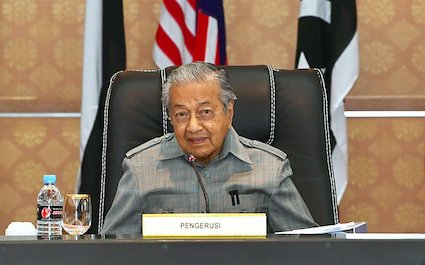A house in disarray

How can our ministers expect to discharge their responsibilities to the rakyat effectively if their own house is in shambles – with suspect ‘advisors’ running riot?
Terence Fernandez, The Star
TUN Dr Mahathir Mohamad is known as a person who always keeps his emotions in check (if you do not count the numerous times he has wept at Umno general assemblies).
Our fourth and current Prime Minister was a picture of calm even when the nation was going through its worst financial and political turmoil.
Hence, his Cabinet colleagues were a little taken by surprise when Dr Mahathir lost his cool at a Cabinet meeting last month, following complaints by ministers that their officers such as press secretaries and political secretaries had not been paid salaries for two months – some of them up to three months.
The matter was reported in the press where Dr Mahathir blamed civil servants loyal to the previous administration and leadership of attempting to undermine the new government by scuttling the appointment of these officers.
Ismail assured that the matter would be resolved within a day.
While several have had their appointments and salaries sorted out, a month on, there are still officers who are taking loans from their friends and colleagues as their pay cheques have yet to be processed.
Some of them are also mired in red tape as the finance and human resources department keep playing poison parcel and pushing papers to one another.
Even letters of appointments are stuck in bureaucracy for some of these officers, who have been performing their duties without official appointment documents, causing confusion among ministry staff, with many refusing to take instructions from the new officers.
At the same time, we now also have “officer without portfolio” running amok in the corridors of power. Some of them are parked in the offices of ministers and are barking orders at everyone, including senior civil servants such as the directors-general and deputy secretary generals.
Several of these “officers” had failed the vetting process (some of which were conducted by Dr Mahathir himself) due to outstanding issues such as conflicts of interest due to business and even insolvency problems.
However, some of these officers found a back-door entry as “advisors” or “someone who sits with the minister in the car”.
One is uncertain how they are paid as they do not fall within the Public Services Department criteria.
And it also begs the question: Why is the minister so adamant in hiring these individuals who do not fit the bill? What is their function exactly?
This sort of ambiguity will result in a negative perception, including that these individuals exist to facilitate contracts.
The Prime Minister keeps emphasising that his administration is one that is governed by the rule of law, but here one has undesignated individuals participating in post Cabinet meetings without being subjected to the same rules of confidentiality that governs others, including ministers and deputy ministers themselves.
Ministers had been reminded that they can only hire up to six officers – usually these make up supporters, aides, friends, and in the case of at least one minister, a business partner.
Some years ago, Tourism Minister Datuk Seri Azalina Othman Said came under fire for cramming her office with 20 staff and instructing the director general of her ministry to make arrangements to pay their salaries through the ministry’s subsidiary companies.
Several of those who had criticised Azalina include current Cabinet leaders. Hence, it would be wise for them to keep their house in order and remind their non-compliant colleagues to abide by the regulations unless they subscribe to the motto “different strokes for different folks”.
While teething issues are expected from an untested government, there is no compromise when it comes to issues relating to rule of law, transparency and governance.
When something as rudimentary as staff hiring is a tangled mess of bureaucracy and controversy, it reflects poorly on the minister, the ministry, and the government as a whole.
If it is true in some cases the civil servants are frustrating these appointments, why are they allowed to hold the government to ransom?
Last weekend, the Prime Minister reminded us not to score own goals by allowing corruption.
Ambiguity, discretion and lack of accountability are ripe conditions for corruption to take root. This is compounded when general orders are not followed; basic needs of staff are not fulfilled; and the entry points to the corridors of power become so porous that those with suspect credentials and motives can gain access.
How do these ministers expect to discharge their responsibilities to the rakyat effectively if their own house is in shambles?
Terence Fernandez is a former senior journalist and is now involved in public relations consultancy.

